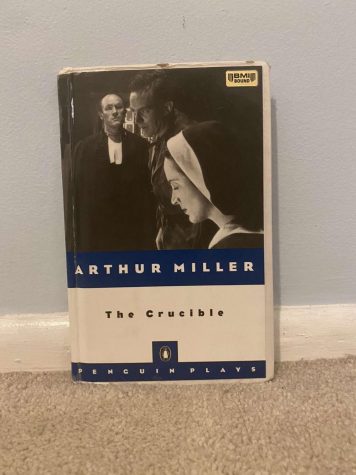Reed Books: The Crucible Acts I and II
February 13, 2020
The Crucible, written in 1952 in America by Arthur Miller, is an ambitious look into the layers of society, mass hysteria, and systematic oppression. While being a bit self-indulgent, the play manages to be well-crafted, not only as a political point, but as a successful narrative as well.
But first, let’s set the scene:
 It’s been only a few years since World War II ended, and America is in the midst of the Cold War with the Soviet Union. Any people suspected of having Communist sympathies are tracked down by certain celebrities, even politicians, and their careers are ruined in an instant. Arthur Miller, playwright, has been accused – “blacklisted” – along with many of his fellow artists or writers. Clearly, there are a myriad of similarities between this setting and that of Salem, Massachusetts in 1692, made famous by The Crucible, but it is Miller’s expert craft that really sells the metaphor.
It’s been only a few years since World War II ended, and America is in the midst of the Cold War with the Soviet Union. Any people suspected of having Communist sympathies are tracked down by certain celebrities, even politicians, and their careers are ruined in an instant. Arthur Miller, playwright, has been accused – “blacklisted” – along with many of his fellow artists or writers. Clearly, there are a myriad of similarities between this setting and that of Salem, Massachusetts in 1692, made famous by The Crucible, but it is Miller’s expert craft that really sells the metaphor.
Instead of only focusing on this clear allegory, Miller takes this play as an opportunity to actually develop the plot and characters. The most well-written relationship in this play is between John Proctor and Elizabeth Proctor. After John cheats on Elizabeth and confesses it, she still finds it hard to trust him, and the two are separated in awkwardness, yet still care for each other. The best example of this is when Reverend Hale is asking John to recite his ten commandments, during which he can only name nine. Elizabeth, cutting in, recites the one he forgot. “Elizabeth, delicately: Adultery, John” (Miller 67). In just these few words, Miller is able to establish the Proctor’s relationship perfectly – the coldness of their love, but the presence of it, still.
However, the play can come across a bit self-indulgent; John Proctor is a clear stand in for the author himself, and, while this generally doesn’t disturb the story, Miller’s own idealization of the character can come across at times. For example, when John and Elizabeth are arguing, John remains angry at Elizabeth for not trusting him, despite his cheating on her, just as Miller did in his own marriage. Luckily, he seems to be aware of this, as Elizabeth sticks up for herself.
Overall, acts I and II of The Crucible aim to cover a lot of ground, and due to Miller’s obvious expertise in character relationships, manages to succeed, as well as provide a fascinating narrative.






















































